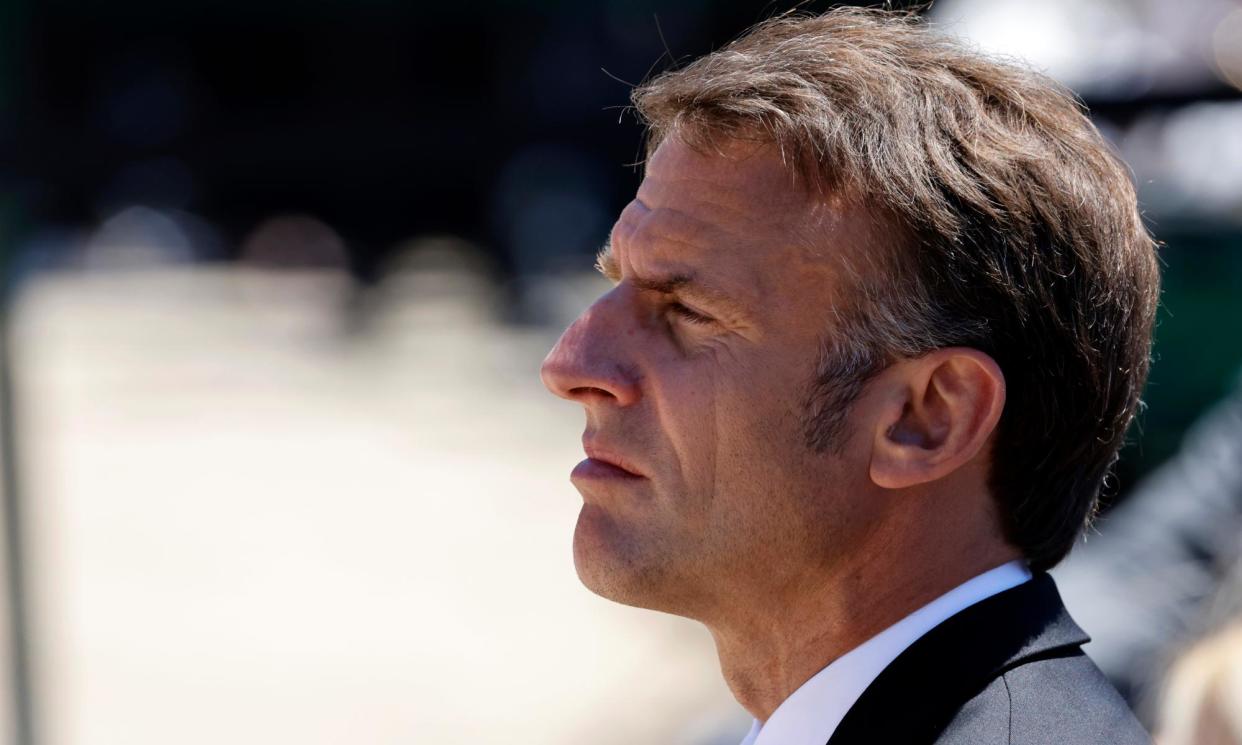Three possible outcomes of Macron’s shocking snap election

Two years into his second term and with three more still to run, Emmanuel Macron’s ratings are not what anyone would call great: 65% disapproval, 34% approval. Since losing his absolute majority in the assemblée nationale in 2022, he has struggled.
Parliament has been increasingly paralysed, with the government relying on ad hoc deals with increasingly reluctant opposition parties or despised constitutional tools to pass unpopular legislation.
All the while, the 88 deputies of Marine Le Pen’s far-right National Rally (RN) – the largest opposition party in parliament – have had what amounts to a free ride, voting against pretty much all the executive proposes, burnishing their image as “responsible” MPs, ready for power.
That was one reason why Macron, to all but universal astonishment, called a snap election on Sunday night: to force the far-right party into a real confrontation, and slow – maybe even reverse – its seemingly unstoppable upward momentum.
National elections, he also reasoned, were not the same as European elections, in which RN’s list – headed by the 28-year-old party president, Jordan Bardella – garnered 32% of the national vote, against 15% for the list backed by the president.
Long seen by voters as a low-risk way to punish whoever is in government, the single-round, national list system of the European ballot favours outsiders; the two rounds of French national elections make it harder for non-mainstream parties to win.
Related: French parties hold emergency talks with possible allies for snap election
Moreover, Macron seems to be calculating that if he can dramatise the choice facing the French the stakes will be raised. In his televised address, he was effectively telling them: “In every election, you vote for them in greater numbers. So now it’s time to decide: do you really want to be governed by the far right?”
Contrary to Sunday’s ballot, this will not be an election for a distant assembly: 70% of voterscould turn out for a national election, compared with 50% for the European poll. Moderates are more likely to mobilise, not stay at home; the fraying anti-far right front républicain may even be at least partly revived.
Related: European elections: Paris and Berlin - not Brussels – will feel heat of far right’s gains
The president’s team know his unpopularity will play into voters’ decisions - but so too, they believe, will a long, hard look at RN’s concrete policy proposals. What is more, the autumn was already spelling grief. A string of censure motions was on its way, likely entailing the collapse of prime minister Gabriel Attal’s government. So why not lance the boil now?
That, at any rate, appears to be the thinking behind Macron’s enormous gamble. What, though, could be the outcome?
Scenario 1: Macron recovers his majority
His advisers have insisted the election will be fought to win.
It is possible he believes he can win a new majority. And when fully engaged on the campaign trail, Macron is an impressive performer. But it feels like way too much water has gone under the bridge for that to happen this time.
In another country, at another time, a passionate appeal to democratic and republican values in the face of a far-right party that, for all its mainstreaming, remains deeply anti-European, Moscow-friendly, nativist and authoritarian might have worked.
But the far right is now largely normalised across Europe, Le Pen’s RN has never been as broadly popular – and left-leaning voters may have been asked once too often to “hold their noses” and vote for a party they do not much like to keep it at bay.
Scenario 2: National Rally wins a majority
Many RN activists were cock-a-hoop when Macron said he was dissolving the assembly: they believe they can win an absolute majority of its 577 seats. If that happens, convention demands that one of their number be named prime minister.
That would most likely be Bardella, who has already said he would be up for it; Le Pen has her eyes set squarely on the presidential election of 2027, for which polls have her as favourite. Though to liberals it sounds the stuff of nightmares, analysts say Macron may quite fancy this scenario.
A president and parliament from opposing parties is known as cohabitation. There is no precedent for a mainstream president “cohabiting” with a far right-controlled parliament – but French prime ministers rarely emerge from the job unscathed.
Macron may be calculating that, confronted with the tough realities of government, Bardella and his cabinet may simply prove not up to the job. Meanwhile, of course, he will sit in the Élysée pointing out their shortcomings.
If that is his next-best option, it is a monumental gamble. RN has proved disciplined in opposition, and an RN-controlled parliament would effectively be in charge of much of French domestic policymaking.
Pensions, unemployment benefit, education, tax, immigration and nationality requirements, public employment, law and order, employment legislation – all fall, in principle, under parliament’s, and the government’s, remit.
Foreign, European and defence policy are the preserve of the president, but RN’s nation-first policies would mean war with Macron and Brussels.
Scenario 3: no overall majority
Most analysts believe the picture viewers are most likely to see on their TV screens on 7 July is a parliament in which Le Pen’s party has significantly increased its MPs – even, perhaps, become the largest single party – but has no absolute majority.
Instantly, problems would arise: the president is theoretically free to appoint who they want as prime minister – but in practice, because parliament can force the resignation of the government, generally chooses someone acceptable to the assembly. Who?
Macron may try to seek alliances with the mainstream centre right or centre left, but how far he will be successful is anyone’s guess. The most likely outcome, perhaps, is an even more splintered parliament and, ultimately, deadlock.

 Yahoo News
Yahoo News 
